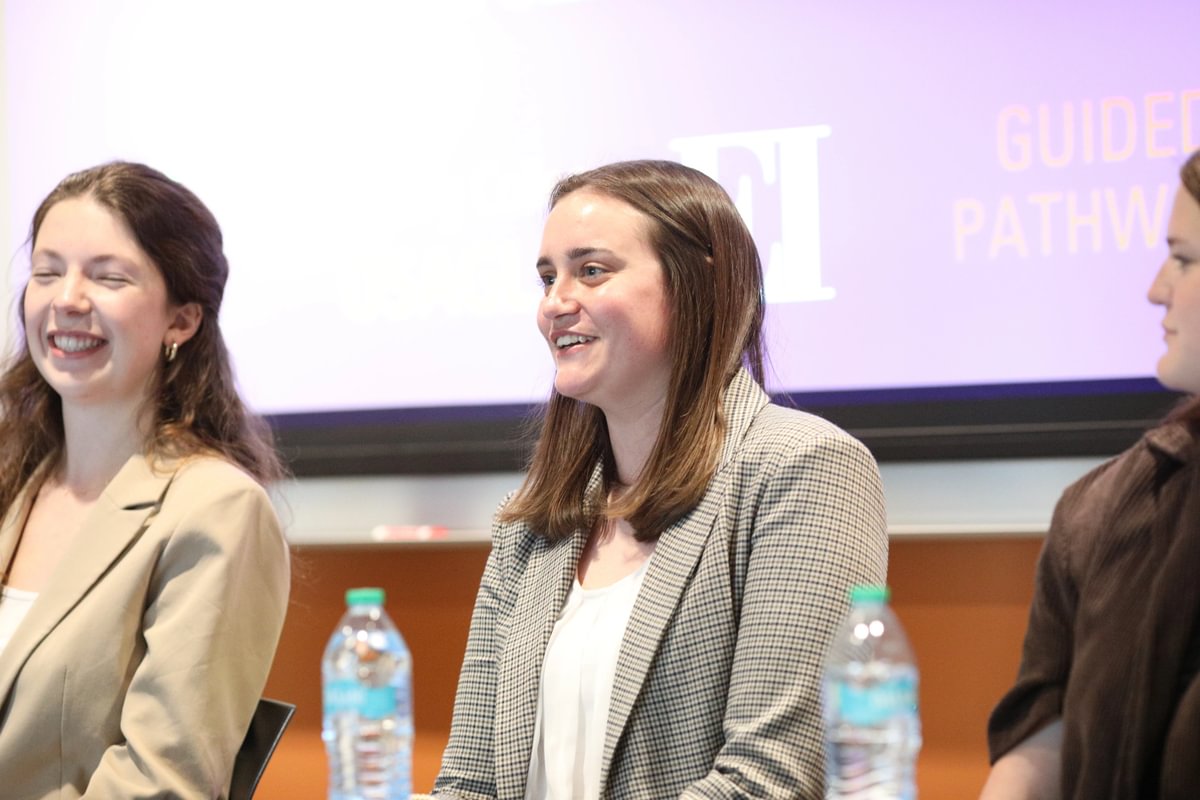

Reflection is a super power. By developing and prioritizing this high-impact practice during your college years, you will gain a deeper understanding of yourself, as well as what you’re learning, why it matters, and how it connects to your future endeavors. It is a habit of mind that often leads to a more purposeful and fulfilling life, and has proven to be a key differentiator in positions of leadership.
At Gettysburg College, we seek to incorporate intentional reflection into all that we do. We devote space for regular student reflection—individually, with a mentor, or with the support of your Personal Advising Team—so you can gain a fuller understanding of the linkages between your campus activities and your career ambitions.
Learn more about Gettysburg’s distinctive approach to reflection from Dr. Andy Hughes, executive director of the Garthwait Leadership Center (GLC).

Reflection is thinking with purpose
The average person has between 12,000 to 60,000 thoughts per day, and most of those are either negative or repetitive. That’s the brain on autopilot. That’s rumination, not reflection. The skill of reflection is about being more aware of and purposeful with your thoughts.
Purposeful thinking—aka reflection—is critical to learning
Absorbing facts is not learning. To truly understand a concept or practice a novel skill, you must “make meaning” of the information based on your own experience, knowledge, and perspective. Reflection is the skill needed to transform this information into new insights. That’s how you make learning more practical, actionable, and meaningful for your personal and professional success.

There are two main ways to reflect
Reflection happens in two main ways: when you write (journaling, writing a paper) and when you talk it out (group dialogue, connecting with a mentor). Both of these reflective practices create the opportunity for purposeful thinking. Reflection is also very personal. So, one of these strategies may be better for you than the other. Do what works best for you.
At Gettysburg College, reflection is taught and practiced in all four years
You will learn to reflect in both ways at Gettysburg—and you will practice reflection throughout the entirety of your undergraduate experience. In addition to the reflecting you’ll do in class, as part of the Gettysburg Approach, you will have the opportunity to choose a Guided Pathway, in which reflection is a critical component.
Through the Guided Pathways, you’ll complete an intentional reflection on your experiential learning activities each semester. Plus, you’ll have access to your own Personal Advising Team—consisting of a faculty advisor, a co-curricular advisor, a career advisor, and following your sophomore year, an alumni mentor—who will help to further develop your reflection skills and how you articulate the insights you’ve gained to potential employers and graduate schools.

Leading is more than just doing
Life, school, and work keep us in motion all the time. This is especially true for student leaders. That means pausing to reflect is even more important. In fact, reflective practice is at the heart of leadership development. Warren Bennis, a foundational writer in leadership development, wrote in On Becoming A Leader:
“There are lessons in everything, and if you are fully deployed, you will learn most of them. Experiences aren’t truly yours until you think about them, analyze them, examine them, question them, reflect on them, and finally understand them. The point … is to use your experiences rather than being used by them, to be the designer, not the design, so that experiences empower rather than imprison.”
Reflection is a privilege for those with time to invest. For those with the time and ability, it is our responsibility to pause and think deeply about our actions, inactions, values, and assumptions. This inner work will lead to greater external impact.

How leaders reflect at Gettysburg
At Gettysburg College, we have a dedicated leadership center that helps all students develop the skills for ethical and effective leadership, including reflection.
Here are a few tips that our Garthwait Leadership Center teaches about purposeful thinking:
- Schedule personal reflection time every week - The busyness of commitments, courses, and tasks tend to prevent aspiring leaders from pausing to reflect. By scheduling even 15 minutes a week to reflect on your accomplishments, shortcomings, and hopes, you can bring intention to your approach.
- Create the right environment for reflection– Find a peaceful and comfortable place away from distractions and interruptions to heighten your awareness and focus on your thoughts.
- Find a mindfulness micro-practice– For example, a five-minute meditation before you walk into a meeting to reflect on how you want to contribute to the conversation empowers you to choose how you want to be present in that moment.
- Get a GLC Journal– Writing in a journal is a common reflective practice for leaders. Stop by the Garthwait Leadership Center to get a free journal!
- Get a Leadership Coach or surround yourself with a Personal Advising Team – Leadership can be lonely at times, and even the most successful people need help. Engaging those around you to challenge and support you helps to unlock your potential and deepens your relationships.
We want to prepare our students to see connections that others can’t see, and solve problems that others can’t solve. This is what will distinguish you in your own leadership practice and position you to make a lasting impact in the world.
For more information about how we cultivate reflection skills through our Gettysburg Approach, visit gettysburg.edu/gettysburg-approach.
By Andy Hughes, executive director of the Garthwait Leadership Center
Posted: 12/16/25


